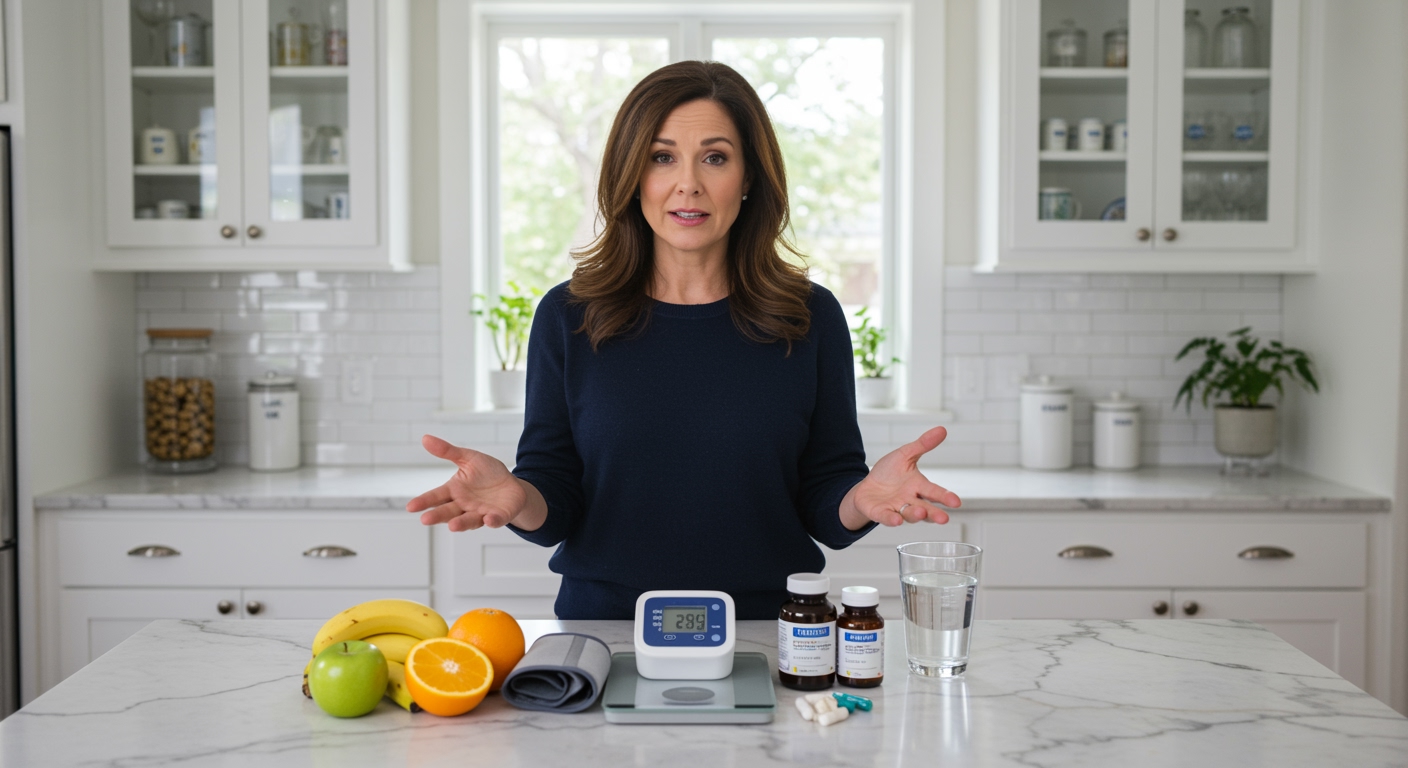✪ Key Takeaway: Hypotension patients should avoid potassium supplements as they can dangerously lower blood pressure further.
Introduction
Your doctor just told you that your blood pressure is too low.
You might be wondering if potassium supplements could help raise your numbers back to normal. After all, you have heard that potassium affects blood pressure in many people.
Hi, I am Abdur, your nutrition coach and today I am going to explain why potassium supplements are not the answer for hypotension and what you should do instead.
How Does Potassium Actually Affect Blood Pressure?
Potassium works as a vasodilator in your cardiovascular system.
This mineral helps your blood vessels relax and widen, which naturally reduces the pressure inside them. When your arteries become more flexible, your heart does not need to work as hard to pump blood throughout your body.
Potassium also helps your kidneys remove excess sodium from your bloodstream.
Less sodium means less water retention, which leads to lower blood volume and reduced pressure on your arterial walls. This mechanism explains why potassium supplements are often recommended for people with high blood pressure.
However, this same blood pressure lowering effect becomes problematic when your baseline pressure is already too low.
✪ Fact: Potassium supplements can drop systolic blood pressure by 3-11 mmHg in healthy adults.
What Happens When Hypotension Patients Take Potassium?
Taking potassium supplements with existing hypotension creates a dangerous cascade of effects.
Your already low blood pressure drops even further, making it harder for blood to reach vital organs like your brain, heart, and kidneys. This can trigger symptoms like severe dizziness, fainting spells, and extreme fatigue that interfere with daily activities.
The orthostatic hypotension becomes more pronounced when you stand up quickly.
Your body struggles to maintain adequate blood flow to your brain during position changes, leading to blackouts or falls that could result in serious injuries. Some people experience chest pain or shortness of breath as their heart works harder to compensate for the reduced pressure.
In severe cases, extremely low blood pressure can cause shock-like symptoms where your organs do not receive enough oxygen-rich blood to function properly.
✪ Note: Blood pressure below 90/60 mmHg combined with symptoms requires immediate medical attention.
Are There Any Exceptions to This Rule?
Most hypotension patients should avoid potassium supplements completely.
However, there are rare situations where a doctor might prescribe potassium for someone with low blood pressure. This typically happens when blood tests reveal a severe potassium deficiency that is actually causing the hypotension in the first place.
Certain medications like diuretics can deplete your potassium levels so dramatically that your blood pressure drops dangerously low.
In these specific cases, carefully monitored potassium replacement might help restore normal blood pressure by correcting the underlying deficiency. Your doctor will order regular blood tests to track your potassium levels and blood pressure response.
Never attempt to self-diagnose or treat a suspected potassium deficiency with over-the-counter supplements.
Only medical professionals can determine if your hypotension is related to low potassium levels and prescribe the appropriate treatment protocol.
✪ Pro Tip: Always request a comprehensive metabolic panel before starting any supplement regimen.
What Should Hypotension Patients Do Instead?
Focus on natural methods that safely raise your blood pressure without supplements.
Increase your daily sodium intake moderately by adding a pinch of sea salt to your meals or drinking electrolyte solutions designed for athletes. Stay well hydrated by consuming at least 8-10 glasses of water throughout the day, as dehydration commonly worsens hypotension symptoms.
Wear compression stockings to improve blood circulation in your legs and prevent blood from pooling in your lower extremities.
Change positions slowly when getting up from sitting or lying down to give your cardiovascular system time to adjust. Regular light exercise like walking or swimming helps strengthen your heart and improve overall circulation.
Eat smaller, more frequent meals to prevent postprandial hypotension that occurs after large meals.
Avoid alcohol and hot environments that can cause blood vessels to dilate further and worsen your symptoms.
✪ Fact: Compression stockings can increase blood pressure by 10-15 mmHg in hypotensive patients.
The Bottom Line
Potassium supplements are not appropriate for most people with hypotension and can make your condition significantly worse.
When dealing with low blood pressure, the goal is to support your body naturally rather than adding supplements that work against you. Work with your healthcare provider to identify the underlying cause of your hypotension and develop a safe treatment plan that addresses your specific needs.
I would love to hear about your experience with managing low blood pressure or any questions you might have about this topic in the comments below.
References
At NutritionCrown, we use quality and credible sources to ensure our content is accurate and trustworthy. Below are the sources referenced in creating this article:
- Harvard Health: Potassium lowers blood pressure
- American Heart Association: How Potassium Can Help Control High Blood Pressure
- Cleveland Clinic: Potassium
- Mayo Clinic: Potassium supplement side effects





